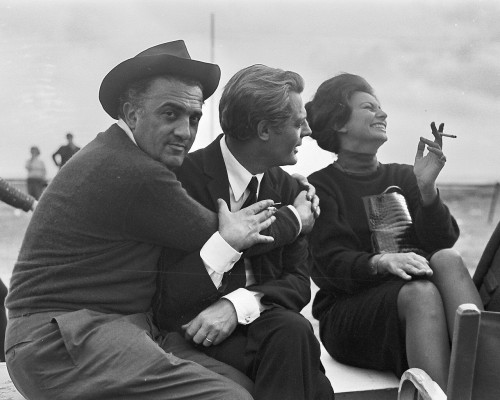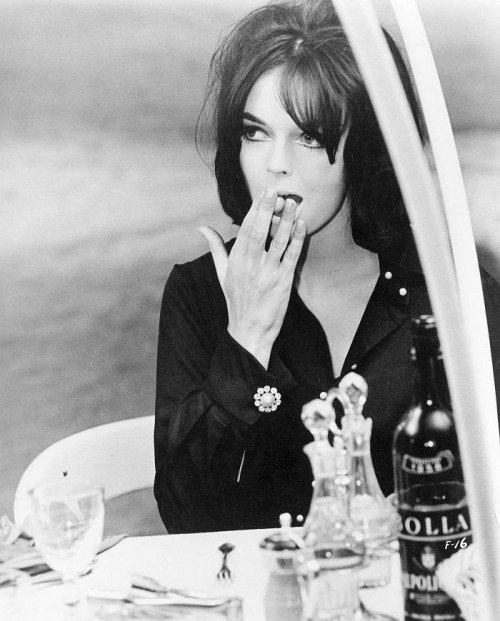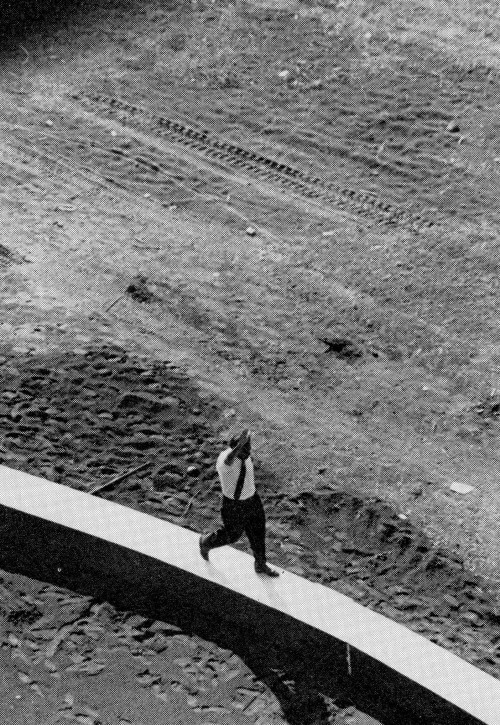Film
9 1/2 Lives, Or Not
Once upon a time I thought Federico Fellini’s 8½ was a perfect movie. The perfect movie. Of course, that’s ridiculous. There is no perfect anything. But one thinks one knows a thing or even two. That’s much of how we get along in the world, from one opinion to the next, doing much selecting, tuning your life to what you’d like to see reflected from out there. I’ve had a lot of perfect movies in my life and now they’re just movies I like and there are a lot of them. Opinions are a pretty kind of paste for brain bricks, and we a bunch of bricoleurs.
httpv://www.youtube.com/watch?v=jmEqBdde5H0
Like Citizen Kane, the style of 8½ has been appropriated to the point it might seem a little unremarkable to the uninitiated (at least that’s what I thought when I started writing this post last December, at my parent’s house near San Antonio, where I tried and failed to rent 8½ from any video store — now, in San Francisco, not so much, it would be not weird to find at a garage sale). I fly between cities named for Saints with pronounced irregularity.
Both Fellini and Welles were relatively radicalized by their respective experiences with these films, Citizen Kane and 8 1/2. Respectively.
The title of the film comes from the fact Fellini failed to make his 8th due to personal issues — he more or less had a nervous breakdown — so he made a film about not making a film, about being unable to know what one wants to say and giving up, figuring he made one-half the other and thus 1/2 and thus 8½.
httpv://www.youtube.com/watch?v=kfFvzGOvZFo
Today you’d be hard-pressed to find a ‘cinephile,’ as in anyone who would call themselves that and probably have a beret around the house they’d be too embarrassed to wear except maybe on camera, or even a Hollywood director, as in anyone who still updates their Myspace Film account and lives in Los Angeles where s/he stares at people in coffee shops, who wouldn’t say 8½ is a masterpiece if you were, say, making a documentary for your TV Production class — after all that’s what sucking dick is for.
The film has been directly referenced (even nerdily recreated) by Todd Haynes (I’m Not There), Rian Johnson (The Brothers Bloom), and Terry Gilliam (Fear and Loathing in Las Vegas), among others. It enjoyed a special screening at the 2009 Cannes Film Festival. And twenty years after its release, the oft-called ‘art film’ was adapted into a Broadway musical (plus book deal combo! score 600 bullshit points!) called Nine, which ran for 729 performances, apparently with the blessing of Fellini himself — when I read this I was like, Wha?
httpv://www.youtube.com/watch?v=YozQlhdu4QU
In 1993, thirty years after the release of 8½, Fellini was awarded an Oscar for Lifetime Achievement. On this occasion Roger Ebert reviewed it, saying that it should be a model for the kinds of films he’d like to see made. Among other things, Ebert said:
These days, directors don’t worry about how to repeat their last hit, because they know exactly how to do it: Remake the same commercial formulas. A movie like this is like a splash of cold water in the face, a reminder that the movies really can shake us up, if they want to. Ironic, that Fellini’s film is about artistic bankruptcy seems [sic] richer in invention than almost anything else around.
Now, twenty years later, nearly fifty years after its release, the play adaptation of 8½ was made into a Hollywood film by Rob Marshall, the director of Chicago. This was last Christmas. That’s when I started writing this. Like the play, the film was called Nine. It tanked. Probably no one knew what it was. Or cared.
httpv://www.youtube.com/watch?v=y_5_lzags3I
So it goes without saying but I’ll say it anyway, the whole business is pretty ironic given the subject matter of the original and the current state of Hollywood musicals. Musicals died, I think, with Bertolt Brecht. With the exception of maybe Willy Wonka & The Chocolate Factory, I can’t think of a musical adaptation that has been worth it for humanity, let alone a musical period. Okay, The Umbrellas of Cherbourg is pretty good.
At first glance, by which I mean the trailer because I didn’t want to help Nine not tank and now that it has I really don’t need to, it seems apparent the director Rob Marshall has effectively stripped Fellini’s work of its heart and left only the skin, the style, coming across, with this adaptation thing in mind, as a grim meditation on the lack of originality in postmodernism, while proving that contention true to the extent that his film is a literal and figurative manifestation of the first, not only in superficial terms, but those of its core. Adaptations are, I think, a cheap way of making art.
In other words, there’s some meta shit going on here but the original is full of meta shit and it’s old so that’s not actually very cool and this is the same for the clothes and the women and so on and so says more on how lame everything is and how nothing has progressed on a technical level and it’s also I don’t know if I mentioned this but it’s a musical for fuck’s sake so who cares Chicago sucked figs for days which is maybe what it was supposed to do, maybe people like that. And what’s worse is this decision is definitely informed by the original. What is the point of doing this if not for laying pipe. I’m never going to see Nine. Not ever, I think. If I can help it. Unless someone goes all Clockwork Orange on me.
Early in 8½ we meet a nice young lady who is studying the loneliness of man in contemporary theater. Soon it becomes clear she is way cray-cray in that way that makes you really want her to ruin your life. She is the mistress of an older man looking a lot like an older version of Guido, the main character of the film, director and idealized stand-in for Fellini himself, played by Marcello Mastroianni. Like much of the film, it’s a joke within a joke.
One thinks first of Beckett, at the height of his popularity at the time. His play Happy Days (1960) was successful in the playhouse the way Sherlock Holmes was successful at AMC when Nine came out. Beckett’s Play (1963), a depiction of relations between a man, his wife, and his mistress, had already been written and would premiere in Germany about one month after 8½ hit the screen in July, the summer of 1963.
Much of the plot hinges on Guido’s attempt to hide his mistress from his wife.
httpv://www.youtube.com/watch?v=NdTjRumkT9k
Beckett made a film called Film in 1965. Much more abstract than 8½ or even Play, it does prove that Beckett didn’t exactly ignore the medium and I’m sure he saw the film. I for one would love to know his opinion of it. Especially now that I am not so much into it. Here is Film and a good discussion of it, as well as Deleuze’s paste on it.
Regardless of any question of influence, this makes me wonder how Fellini’s film was received by the people who considered themselves part of the general avant-garde if you asked them Excuse me, but are you a member of the general avant-garde? at a dinner party held at their huge home which you attended in your only set of formal wear because you were starving for a decent meal. After all, 8½ won two Oscars, including Best Foreign Film. Then I wonder, why I do I give a fuck about the vintage avant-garde. Anyway, what happened was, under the tutelage of Roberto Rosselini, Fellini began his life in film as a neorealist. And of course, Hollywood loved neorealism — its style informed a lot of 1950s American cinema. Fellini was nominated for Oscars a number of times for screenwriting. So when he began making ‘art films,’ it was as an established Hollywood dandy, not a surrealist in the way of say, Luis Buñuel.
The question is, has surrealism been appropriated via 8½ or did Fellini appropriate surrealism in 8½? Perhaps the battle that began with the film has carried itself out to the point that commercials are now more surreal than art films, as discussed in Justin Taylor’s post, When the Establishment is Infinitely more Avant-Garde than the Avant-Garde, is it not time to Reconsider Our Notion of the Avant-Garde?
While my gut-jerk reaction was to scorn Nine for being made in the first place, for taking the story of what I considered a masterpiece, mangling it into some contrived Hollywood musical, I’ve come to realize that the AMC movie theatre was a fitting deathbed for my own perception of 8½ as a masterwork. Because maybe it isn’t, maybe it never was. Maybe I just saw it that way once and now I see how it’s a ruse. I’ve had wool over my eyes for years. That doesn’t mean it isn’t technically perfect, but neither isn’t David Copperfield. Maybe it does mean it never did anything new or challenging the way I once thought it had. And so maybe Nine‘s rehashing of a masterpiece is more a natural endpoint for what Fellini started than a simple matter of shitting on it.
The problem, of course, is that 8½ is very much aware of itself, of its own juxtaposition between realism and surrealism, commercialism and art. Just before the final scene, in which the entire cast returns to join hands, dancing around the circus stage, the ‘intellectual’ screenwriter says something to the effect of, this movie will probably be remade someday. Something along the lines of Fukayama’s “The End of History?” Something like we are doomed to rehash the same garbage over and over again and it is maybe not so bad.
The vintage avant-garde began with Alfred Jarry‘s production of Ubu Roi, a satire of Macbeth that began as a schoolboy tradition of poking fun at a physics teacher. While his classmates ‘grew up’ and forgot about the story, about the tradition, Jarry was a ‘Toys “R” Us kid.’ By transplanting this his childhood story from the theater of childhood to the adult theatre, he created the whole notion of what it was to be avant-garde — ruled always by perverse instincts, always at odds with those who attempt to comprehend its own (or any other) rationality. And maybe that’s because it doesn’t exist except in the shadow of its opposite: tradition.
Much like Schrodinger’s Cat, maybe Fellini’s 8½ never existed until now because the things it predicts have happened, and as it has been reproduced down the line the line has been soaked in kerosene and finally it meets a lit match. Or not. Like the cat, maybe it never did and doesn’t, except in my mind and maybe yours, the intersections, reflections of others making points possible. Maybe the intersection of art and commerce is a rude-smelling sock. Wool. Maybe it is a pair of Toms. What were we talking about again? One wonders sometimes what anyone is ever really talking about. The other thinks everything is full of meaning. Sometimes things seem worth talking about and sometimes not. Always it seems best to let go, eventually.





Emphatically, I toast thee, Reynard! Most good post, indeed. Enjoyed, enjoyed, enjoyed.
But by my green candle, when considering worthy musicals don’t count out Godard’s Une Femme est une femme, Fosse’s All That Jazz, Donen’s Singin in the Rain, Sharman’s Rocky Horror Picture Show, or the first three Muppet movies.
I like this. I think you bring up a very important point to: just because something is old that doesn’t mean it’s “more legit” than something contemporary. A lot of “entrance level film nerds” (aka the new cinephile) are going to be a person who immediately assumes that, without ever considering the potentiality that, “hey, shit was kind of dumb even back then.” this is a particularly apt thing to say about horror movie fans, which is really annoying, because if anything the best horror film ever came out in the last 15 years. the fact is at all times in all places there are both shitty movies and good ones.
Thought-provoking post Reynard. I’m most curious about the question “has surrealism been appropriated via 8½ or did Fellini appropriate surrealism in 8½?” and also the awareness of Fellini and the film. The first question, although you don’t necessarily state that it has one answer or not, instead posing it, seems to be a neither issue, because the awareness itself grounded the film, the “not-being-able-to-make-a-filmness” made the piece what it is and even more made it a desirous form of reproduction; surrealism is waylaid a bit because of this, less a centrality. I think that there are two types of remakes involved here too: there are those that attempt to emulate and those that are direct reactions to how amazing something is, that it makes one want to make. I don’t think that I’ve ever fully enjoyed 8 1/2 because it seemed as though in order to know Fellini, as a young enjoyer of cinema, one should watch this film first, which is the last thing that I’d now suggest. It’s “newness” has only only evolved into renewedness, which is the contemporary equivalent of someone wanting to emulate something after not having sat through its whole. Anyway, before too much confusion from my end thanks for the post, the Beckett stuff will add more immersion and concentration.
This is a fun blur of a commentary, Reynard. Clearly, tastes and perspectives of artists and audiences change over time, none of which matters so much in the end, I think. The work is the work. That’s what matters. And doesn’t. One and the same. My favorite lines: “One wonders sometimes what anyone is ever really talking about. The other thinks everything is full of meaning.” I do wonder, and I think (sometimes). This post compelled me to do both.
I will shamelessly admit to having a soft spot in my heart for the movie version of Oklahoma! always and forever. Gordon MacCrae singing Oh What a Beautiful Morning, a pureness of heart that I fear no longer (or Never Really) exists. Shameless Nostalgia for ? ? I don’t Want to Think.
Good Post, Rey-Rey.
tenacious d and the pick of destiny was a good musical
When a man wanted to imitate walking, he invented the wheel, which does not look like a leg. Without knowing it, he was a Surrealist.
–Apollinaire
How many legs does a movie camera have? a film projector? a box of licorice?
There are already too many superfluous things in this world. Why add mess to the clutter?